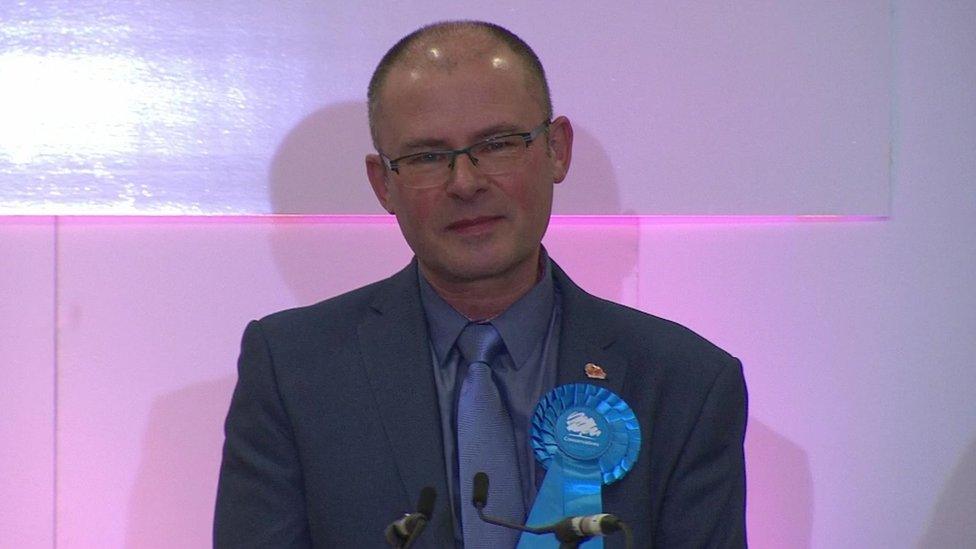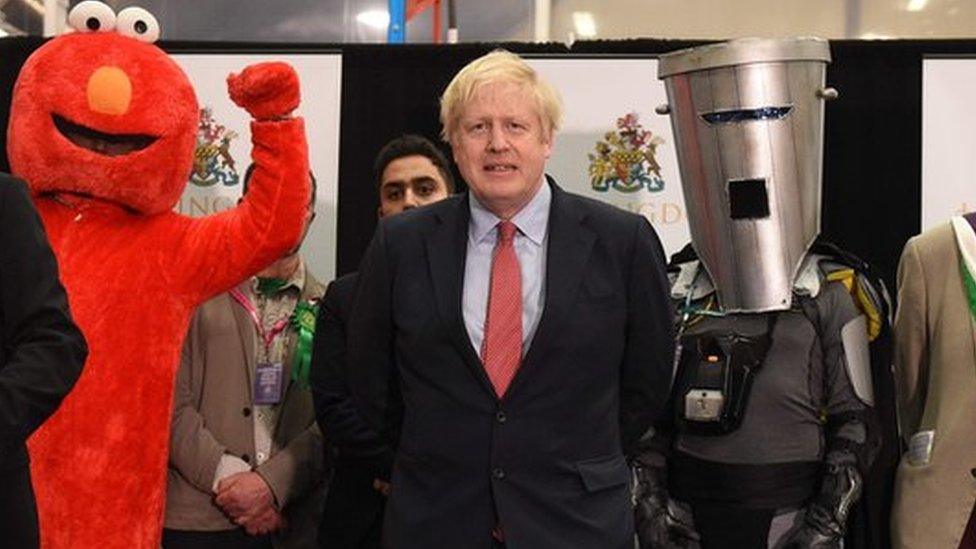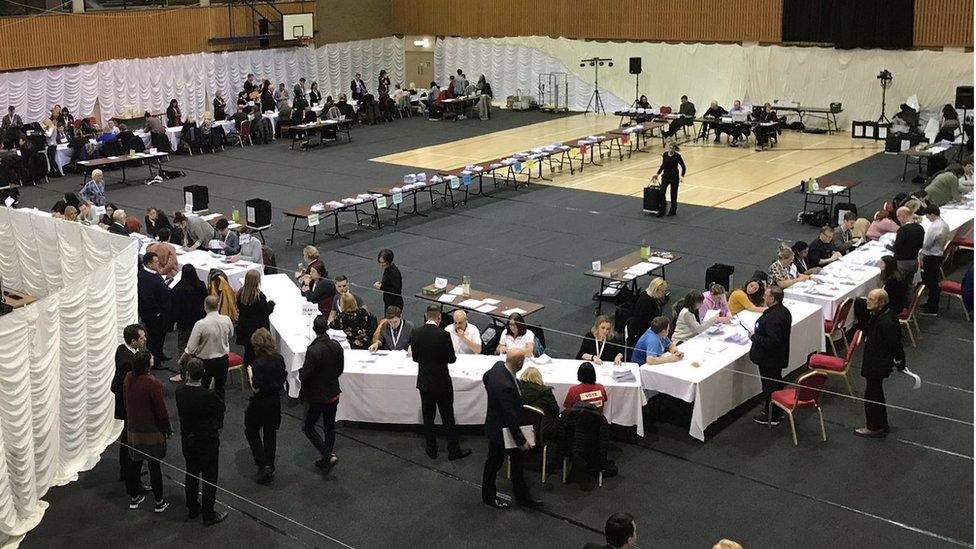Blyth Valley election result: Shock win as Tories take Labour seat
- Published
Conservative win announced in Blyth Valley, breaking Labour's 50-year hold in the former mining constituency
The Conservatives have taken Blyth Valley which has been Labour since it was created in 1950, in the first shock result of the general election.
Ian Levy got 17,440 votes, beating the Labour candidate by more than 700 votes.
There was also a win for the Tories in Durham North West, where Labour's Laura Pidcock lost to Richard Holden.
Labour has held on to all the other seats in the region, but in almost every case with a reduced majority.
In Wansbeck, Labour Party chairman Ian Lavery retained the seat but with his majority slashed from 10,435 to 814.
"This isn't about Jeremy Corbyn - this is about Brexit," he said.
"This is about the re-run of the 2016 referendum. You ignore democracy at your peril."

Laura Pidcock was seen as a potential leadership contender and featured heavily in Jeremy Corbyn's Labour campaign
It is the first time that Blyth Valley, a former mining area which voted Leave in the EU referendum, will have a Conservative MP.
The constituency's former incumbent, Ronnie Campbell, stood down after more than 30 years.
Speaking after the result, Mr Levy thanked his team, his wife, the people of Blyth Valley and Boris Johnson.
"This is a huge responsibility I have taken on," he said.
"I will be going to London on the train on Monday, we're going to get Brexit done and build a strong economy for the UK."

Ian Levy, a former NHS worker, thanked Boris Johnson after his shock win
Prior to the loss of her Durham North West seat, Laura Pidcock was seen as a potential leadership contender.
In 2017, her majority was more than 8,000.
Its new MP, Richard Holden said: "Laura represented a very Corbynite streak of the Labour Party, which had been comprehensively rejected by local people.
"On the doorstep, more than anything else, what was pushed back on was Jeremy Corbyn's leadership. That's why this result has occurred here tonight."
Allow X content?
This article contains content provided by X. We ask for your permission before anything is loaded, as they may be using cookies and other technologies. You may want to read X’s cookie policy, external and privacy policy, external before accepting. To view this content choose ‘accept and continue’.

Newcastle Central was the first seat in the UK to declare, with Labour's Chi Onwurah holding on to the seat.
Labour also held on to Sunderland Central, Newcastle East, Newcastle North, South Shields, Washington and Sunderland West, Jarrow, Gateshead, and Houghton and Sunderland South.
In Gateshead, Labour's Ian Mearns, who polled 20,450 votes, down from 27,426 in 2017, said his party had "got the message wrong" on Brexit.
He said Labour had allowed itself to be "dominated by a London-centric view".
In Wansbeck - which was held by Labour chairman Mr Lavery - there was an 11.6% swing from Labour to the Conservatives.
Result for Blyth Valley

If you cannot see the graphic click here, external
Bridget Phillipson was returned for Houghton and Sunderland South with a majority down from 12,341 in 2017 to 3,115.
"The Labour Party was founded to advance the interests of working people and we are failing in that mission if we don't secure the confidence of enough working people in the country to form a government," she said.
Allow X content?
This article contains content provided by X. We ask for your permission before anything is loaded, as they may be using cookies and other technologies. You may want to read X’s cookie policy, external and privacy policy, external before accepting. To view this content choose ‘accept and continue’.
Julie Elliott, who retained Sunderland Central but with a 2017 majority of 9,997 reduced to 2,964, said Labour had "let the country down by not being good enough to win against this awful Tory government".
"People on the doorstep have repeatedly said to me they cannot vote for this party," she said.
"They will come back to us if we become a radical party for change on the centre-left ground which is where we win elections."
Labour also held on to Blaydon, City of Durham, Durham North and Gateshead.

WHO WON IN MY CONSTITUENCY? Check your result, external
NATIONAL PICTURE: The result in full, external
ALL YOU NEED TO KNOW: The night's key points
MAPS AND CHARTS: The election in graphics, external
LAURA KUENSSBERG: Same PM, new map
IN PICTURES: Binface, a baby and Boris Johnson

Analysis
By Richard Moss, BBC Look North Political Editor
The North East has seen the equivalent of a political earthquake.
The region has not seen as many seats change hands in one election in living memory.
Margaret Thatcher never had as many MPs in this region as Boris Johnson will have. Some now represent constituencies we were told would never vote Conservative.
Communities built on the steel industry, like Consett and Redcar, and former mining areas like Blyth Valley and Bishop Auckland have placed their trust in the Tories.
The Labour party chairman Ian Lavery, a former miner, survived by the skin of his teeth in Wansbeck. Laura Pidcock, a Corbynite who could have been in the running to be the next Labour leader, saw North West Durham's voters reject her.
So what happened? "Get Brexit Done" certainly resonated. The gains were all in leave-voting seats which seem to have blamed Labour for the parliamentary deadlock.
But Labour candidates will tell you that Jeremy Corbyn was a bigger issue on the doorstep - not a man many of their voters wanted anywhere near Number 10.
But there are dangers. Economists suggest it's the North East that will suffer the most economic harm from leaving the European Union. And just talking about the idea of a Northern Powerhouse will no longer be enough.
Constituents of these new Conservative MPs will expect them and their party to deliver Brexit, but also more investment in the North.
Results lookup
Related topics
- Published13 December 2019

- Published6 December 2019
